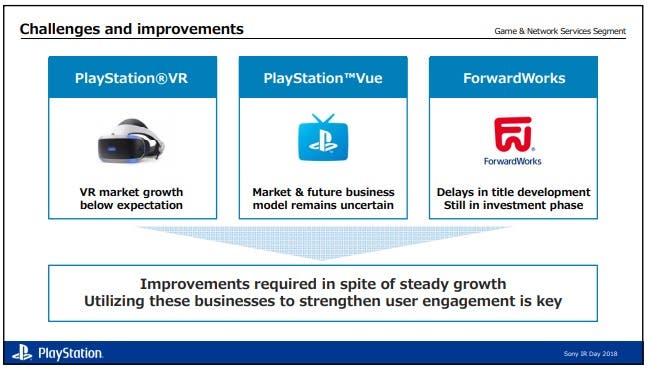Sony: VR market growth "below expectation"
Is the dream over?
A few years ago, as Facebook forked out $2bn for Oculus and Valve and Sony entered the fray with fancy tech of their own, virtual reality looked like it might have become the next big thing not just in video game land, but in entertainment.
Fast forward to 2018, and things haven't grown quite as fast as some of the major players had hoped.
One of those major players is Sony, which released the PlayStation VR headset in October 2016. As of December 2017, PSVR had sold two million units.
Yesterday, during an investor relations event, Sony said that while the PSVR specifically was growing, growth for the overall VR market was "below expectation".
The line came in a note under the "challenges and improvements" section of a presentation on Sony's video game business, called the game and network services segment.

Clearly, Sony reckons VR has failed to take off in the way it had expected. But it's not alone. Earlier this month, Oculus VR's Matt Conte told Eurogamer sister site GamesIndustry.biz the size of the VR market in 2018 is smaller than it had hoped.
"I'm not going to mince words: VR is still small," he said in a warning to developers. "There's not as many headsets out there as we thought there might be a couple of years ago. It's growing, and it's actually growing at a pretty decent pace, but every decision that you make you should be thinking about: How does this get my title into the most users' hands as possible?
"Some people find it weird that we tell them to ship on all platforms. We don't want exclusivity. We want VR to thrive. But VR is a niche, and you don't want to be a niche within a niche. Ship everywhere: Oculus, PlayStation VR, Steam, mobile, if you can. Do whatever you can to get as many eyes on it as possible."
Back in December 2016, developer Dean Hall spoke about the challenges of working in VR after releasing Out of Ammo.
Hall was responding to a growing wave of criticism levelled against developers "selling out" and signing exclusivity deals for PC VR platforms Oculus Rift or HTC Vive, therefore restricting games to one platform either forever or for a certain amount of time (a timed exclusive).
By dispelling these "terrible assumptions", Hall revealed some startling truths of his own. He said Out of Ammo was "very unprofitable" despite exceeding sales expectations and "selling unusually well compared to many other VR games".
"It is extremely unlikely that it will ever be profitable," Hall said. "We are comfortable with this and approached it as such. We expected to lose money and we had the funding internally to handle this.
"There is no money in it," Hall said of VR. "I don't mean 'money to go buy a Ferrari', I mean 'money to make payroll'. People talk about developers who have taken Oculus/Facebook/Intel money like they've sold out and gone off to buy an island somewhere. The reality is these developers made these deals because it is the only way their games could come out."
So, what's holding VR back? As a self-confessed VR sceptic, my issues include the fiddly nature of the headsets, the time it takes to set them up, the sheer number of cables required for it all to work, the high cost of entry and a distinct lack of killer apps. Oh, and the things make me feel sick.
Despite all this, VR soldiers on, and Sony has said it remains committed to the PSVR.



